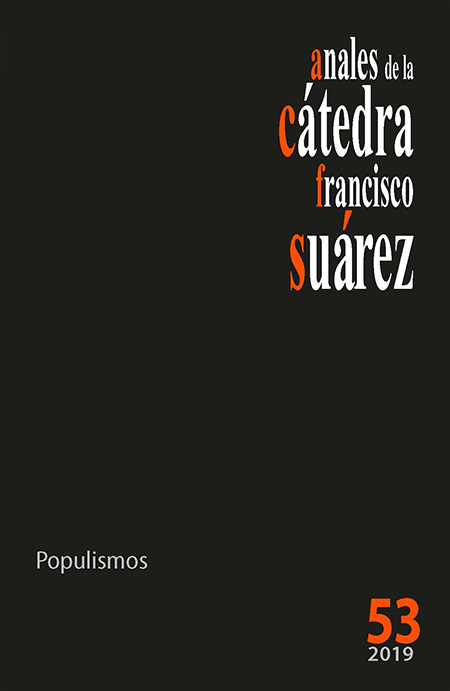De la clase social al pueblo y del pueblo a la clase sexual
DOI:
https://doi.org/10.30827/acfs.v53i0.7299Palabras clave:
Pueblo, populismo, clase social, feminismo, clase sexualResumen
Se abordan las nociones de “pueblo” y de “populismo” desarrolladas por Laclau y se presenta la crítica de Zizek a la noción de “pueblo”, desde su defensa de la categoría de “clase social”. Posteriormente se exponen los vínculos entre la teoría queer de Butler, la ciudadanía democrática radical de Mouffe y el populismo de Laclau y se presentan las críticas feministas dirigidas contra el desplazamiento de la categoría “mujeres” efectuado por dichas filosofías. Finalmente se abordan, desde la obra de Millett, MacKinnon y Firestone, las discrepancias entre el marxismo y el feminismo entorno al antagonismo principal de la sociedad (clase social/clase sexual). Así el trabajo aborda las tensiones y desplazamientos entre las categorías “pueblo”, “clase social” y “clase sexual” y la capacidad de cada una de ellas para desencadenar la transformación de la sociedad.
Descargas
Citas
Badiou, A. (2012) El despertar de la Historia. Ediciones Nueva Visión. Buenos Aires.
Breckman, W. (1999) Marx, the Young Hegelians and the Origins of Radical Social Theory, Cambridge University Press, Cambridge.
Butler, J. (1990) Gender Trouble: Feminism and the Subversion of Identity, Nueva York, Routledge.
Canovan, M. (1981) Populism. Junction Books. Londres.
Engels, F. (1994), Socialism: Utopian and Scientific. International Publishers. Nueva York.
Fraser, N. (1997), Iustitia Interrupta: reflexiones críticas desde la posición «postsocialista», Siglo del Hombre Editores, Santa Fe de Bogotá.
Firestone, S. (1976). La dialéctica del sexo. El defensa de la revolución feminista. Kairós. Barcelona.
Hardt, M y Negri, A. (2005) Multitud. DeBolsillo. Barcelona.
Laclau, E. (2015) La razón populista. Fondo de Cultura Económica. Madrid.
Laclau, E. y Mouffe, C. (1985) Hegemony and Socialist Strategy. Towards a Radical Demoeratic Polines, Verso. Londres.
López Penedo, S. (2008). El laberinto queer. La identidad en tiempos de neoliberalismo, Editorial Egales, Madrid.
Marx, K. (1997) El Capital I. Folio. Barcelona.
MacKinnon, C. (1995) Hacia una teoría feminista del Estado. Cátedra. Madrid.
MacIntyre, A. (1984) Alter Virtue, University of Notre Dame Press. Notre Dame, Indiana.
Millett, K. (2010) Política sexual. Cátedra. Madrid
Mouffe, C. (1999) El retorno de lo político. Comunidad, ciudadanía, pluralismo, democracia radical. Paidós. Barcelona.
Pitkin, H. (1967) The Concept of Representation, University of California Press, Berkeley
Posada Kubissa, L. (2014) Teoría queer en el contexto español. Reflexiones desde el feminismo. Daimon. Revista Internacional de Filosofía. 63. 147-158.
Rawls, J. (1971) A Theory of Justice, Harvard University Press. Cambridge MA.
Surel, Y. (2003) “Berlusconi, leader populiste?”. En La tentation populiste en Europe. La Découverte. París. 113-129.
Taylor, C. (1985) “Atomism”. En Philosophy and the Human Sciences, Philosophical Papers, 2, Cambridge.
Worsley, P. (1969) The concept of populism. En Populism. Its Meaning and National Characteristics, MacMillan. Londres. 112-250.
Zizek, S. (2000) Mantenerse en el lugar. En J. Butler, E. Laclau y S. Zizek, Contingency, Hegemony, Universality. Verso. Londres. 316-317.
Zizek, S. (2000) ¿Lucha de clases o posmodernismo?. En J. Butler, E. Laclau y S. Zizek, Contingency, Hegemony, Universality. Verso. Londres.
Zizek. S. (2016) Problemas en el paraíso. Del fin del capitalismo al fin de la historia. Anagrama. Barcelona.
Descargas
Publicado
Cómo citar
Número
Sección
Licencia
Los nombres y direcciones de correo-e introducidos en esta revista se usarán exclusivamente para los fines declarados por esta revista y no estarán disponibles para ningún otro propósito u otra persona.
Los autores y autoras poseen los derechos sobre sus trabajos. Los ACFS ruegan que se haga constar la publicación en los mismos si aparecieran con posterioridad en otro medio.

















